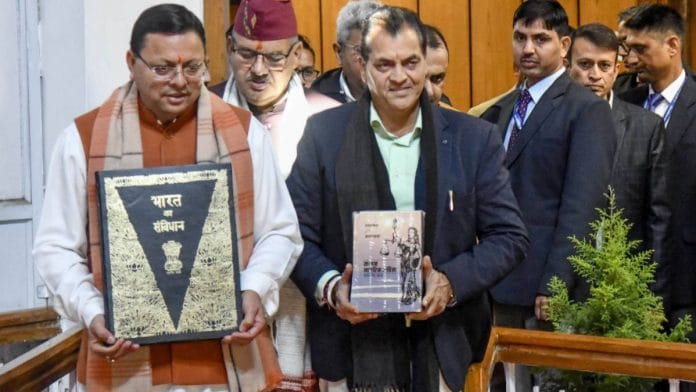Thank you dear subscribers, we are overwhelmed with your response.
Your Turn is a unique section from ThePrint featuring points of view from its subscribers. If you are a subscriber, have a point of view, please send it to us. If not, do subscribe here: https://englishdev.theprint.in/subscribe/
We have grown up aware that as the citizens of a democratic country, our rights as citizens are protected by the laws and the Constitution. We are proud of the diversity, the languages, the multiple cuisines we experience, and the fact that this complex society is one where this diversity is celebrated. My family takes pride in being citizens of India, and that’s the environment I grew up with.
Recently, I have been hearing about the legislation of the “Uniform Civil code” from various online platforms and the news. At home, I have regular conversations with my parents about national and global issues and UCC was in our discussions of late. What I understand is; Currently in India for every religion, the personal law changes. Personal law encompasses marriage, divorce, inheritance, adoption, child custody and succession. These laws differ from religion to religion, creating an inequality in laws which are personal to citizens of India.
This UCC of Uttarakhand state says that despite a person’s religion, they will follow a common civil code of the listed provisions. In my opinion, it did not seem to be against or biassed towards anyone.
I did some reading on this. Some of the provisions seemed to be very logical. Implementing equal inheritance laws for both male and female children, prohibiting polygamy, and ensuring uniform marriage ages for women across religions. This is the need of the hour in the modern age. Even in the constitution, the creation of a uniform civil code was only a part of the directive section. However, it raises the question of why these reforms were not introduced earlier. The Hindus had a Hindu Succession Act passed in 1956 that applied to Hindus, Sikhs, Jains, and Buddhists, but not Muslims, Jews or Christians. Most personal laws based on religion were decided centuries ago and in different circumstances, therefore they do not seem to be applicable to the contemporary world. In today’s society, there should be the same morally correct civil behaviour laws that apply to all citizens irrespective of race, religion, or sex. Therefore this code seems to be a logical step in that direction
I did some research on this topic and found some interesting aspects. I learnt that the UCC, like almost everything, is not entirely black and white. Even the concept of Uniform Civil Code, while sounding ideal, is not fully perfect in my opinion. Let me list out what I found to be the grey areas of the uniform civil code.
- LGBTQIA+ Exclusion – The inclusion of gender-neutral laws and eliminating some gender discriminatory personal laws is a welcomed and much needed step! I don’t believe that this will be seen as a negative by any citizen of the country. But why is it only talking about women equality? The same rights should be given to the LGBTQ+ community too. This bill makes no mention about the legality or protection to same sex partners in marriage or live- in relationships. Gender fluidity is real, and a law needs to address this issue. By excluding them from this gambit, it makes this an exclusive law rather than an inclusive one, which it was intended to be. Two consenting adults have a right to be together irrespective of sex, religion, race, or caste.
- Exceptions to tribal communities – Why? My assumption is that the tribal communities are less developed. The best way to enhance their development is advancing the rights of women. A society that gives them equal opportunities and rights always begins to prosper. By excluding them, the law seems to have lost its intent.
- Live In relationships – Why is it compulsory to register when a man and woman are simply living together? I may live in a two-bedroom house with a male flatmate. That does not mean that we are a couple. As a woman, I may decide to delay or even not marry if I want to focus on my career, or any other reason. Some women may not want to have children but still like to be in a loving relationship. There may be reasons to keep this private and confidential. It should be voluntary to register a live-in relationship, similar to a prenuptial agreement before a wedding. By making it an offence to live in without registration, this law borders on becoming draconian and meddlesome to say the least.
This could have been a law that moved to make a better society. It is turning out to be a half-baked activity of cancelling the incorrect personal laws of one community to please the electoral majority. However, it could be considered to be a step in the right direction. Nonetheless, many steps are left to be covered.
These pieces are being published as they have been received – they have not been edited/fact-checked by ThePrint.


